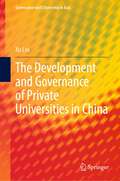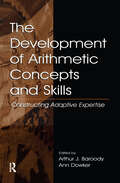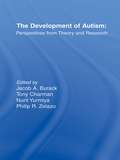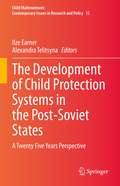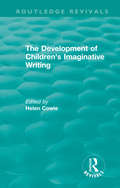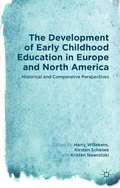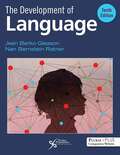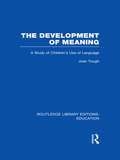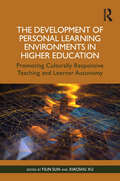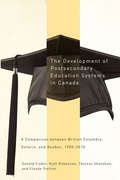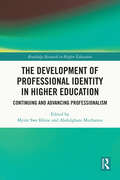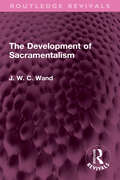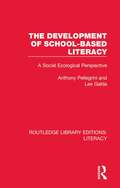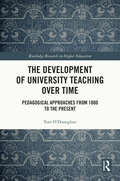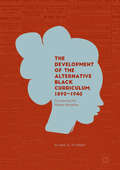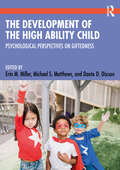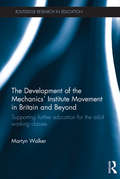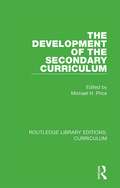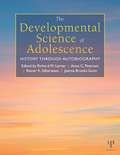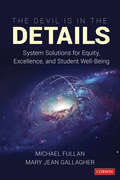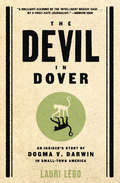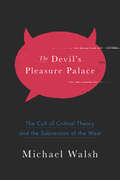- Table View
- List View
The Development and Governance of Private Universities in China (Governance and Citizenship in Asia)
by Xu LiuThis book investigates the form and features of governance and the factors that shape governance in practice in private universities in China. Building on an exploration of the growth of private universities in China after the Communist Party took over the power, the study examines the specific context in China, including the role of the Communist Party, and integrates with shareholders and senior managers to achieve its governance role. It shows that two distinct forms of institutional governance have developed, namely the supervision form and the managerial form. While external policies provide an impetus for change for each university, how key actors in institutional governance understand these policies have significant effect on how the policies are implemented. This can result in change that can be viewed as either symbolic alteration or as operational change. The internal factors that act to shape institutional governance mainly relate to the different developmental stages of the private university, the characteristics of shareholders and senior managers, and the various ways the universities respond to the external policy.
The Development of Arithmetic Concepts and Skills: Constructive Adaptive Expertise (Studies in Mathematical Thinking and Learning Series)
by Ann Dowker Arthur J. BaroodyThis volume focuses on two related questions that are central to both the psychology of mathematical thinking and learning and to the improvement of mathematics education: What is the nature of arithmetic expertise? How can instruction best promote it? Contributors from a variety of specialities, including cognitive, developmental, educational, and neurological psychology; mathematics education; and special education offer theoretical perspectives and much needed empirical evidence about these issues. As reported in this volume, both theory and research indicate that the nature of arithmetic expertise and how to best promote it are far more complex than conventional wisdom and many scholars, past and present, have suggested. The results of psychological, educational, and clinical studies using a wide range of arithmetic tasks and populations (including "normally" and atypically developing children, non-injured and brain-injured adults, and savants) all point to the same conclusion: The heart of arithmetic fluency, in general, and the flexible and creative use of strategies, in particular, is what is termed "adaptive expertise" (meaningful or conceptually based knowledge). The construction of adaptive expertise in mathematics is, for the first time, examined across various arithmetic topics and age groups. This book will be an invaluable resource for researchers and graduate students interested in mathematical cognition and learning (including mathematics educators, developmental and educational psychologists, and neuropsychologists), educators (including teachers, curriculum supervisors, and school administrators), and others interested in improving arithmetic instruction (including officials in national and local education departments, the media, and parents).
The Development of Autism: Perspectives From Theory and Research
by Jacob A. Burack Tony Charman Nurit Yirmiya Philip R. ZelazoDedicated to the memory and work of Lisa Capps, this volume is a forum for scholars and practitioners interested in the typical and atypical development of persons with autism. Each chapter is focused on theoretical considerations and the empirical evidence regarding a specific aspect of functioning, but common themes of development are considered throughout. Within this framework, the contributors provide a detailed and comprehensive account of the development of persons with autism. The book is divided into four sections: (1) Developmental, Neurobiological, Genetic, and Family Considerations; (2) Attention and Perception; (3) Cognition, Theory of Mind, and Executive Functioning; and (4) Social and Adaptive Behaviors. With the consideration of this broad range of topics, this volume is both a state-of-the-art resource about autism and a unique contribution to the study of development. It will be of interest to researchers and care providers from several domains, including psychology, psychiatry, social work, developmental psychology, and education. This volume can be used as a text in graduate and advanced undergraduate courses, and as a resource in applied settings.
The Development of Child Protection Systems in the Post-Soviet States: A Twenty Five Years Perspective (Child Maltreatment #12)
by Ilze Earner Alexandra TelitsynaThis volume provides an understanding of how systems of child protection evolve in disparate cultural, social and economic contexts. Using the former Soviet Union as a starting point, it examines how 13 countries have developed, defined and evolved their system of protecting children and providing services to families over the last 25 years since independence. The volume runs an uniform approach in each country and then traces the development of unique systems, contributing to the international understanding of child protection and welfare. This volume is a fascinating study for social scientists, social workers, policy makers with particular interest to those focusing on children, youth, and family issues alike as each chapter offers a clear and compelling view of the central changes, competing claims and guiding assumptions that have formed each countries individual approach to child protection and family services.
The Development of Children's Imaginative Writing (Routledge Revivals)
by Helen CowiePublished in 1984. The more we know about young writers, the more we observe them as they write, discuss the composing process with them, talk to them about the sources of their ideas and the difficulties which they encounter as they try to captures thoughts and feelings in words, the greater will be our understanding of imaginative activity and the part it plays in children’s personal and social development. This is the essential theme of the book and the contributors stress the importance of sympathetic and sensitive guidance by teachers and parents in encouraging the imaginative process in young children. The personal diaries, stories and conversations with young writers which appear in this book illustrate how children can use imaginative writing as a means of coming to terms with social and emotional issues in their lives. The book presents first a theoretical analysis of the imaginative writing process and then goes on to explore children’s growing awareness of themselves and others through their perception of sex-roles, their way of dealing symbolically with illness and death, fear and separation, religious and spiritual experiences, and their understanding of social relationships with family and friends. The writing process itself is examined in detail and parallels drawn between the adult and child writer. The final part of the book presents children’s own reflections on writing, shows one classroom community in action and discusses the extent to which children themselves can gain control of their own writing process.
The Development of Early Childhood Education in Europe and North America
by Kristen Nawrotzki Harry Willekens Kirsten ScheiweIn recent decades policies aiming at work-family reconciliation, at social integration and at the development of children's human capital have strongly influenced the expansion of early childhood education and care throughout much of the Western world. There are, however, striking differences between national regimes regarding the extent of these services, their organisation and their position within the welfare state and educational system. Many of these differences cannot be satisfactorily explained by reference to recent policy decisions, but must be understood in the context of the historical background of provisions for children below school age. This book focuses on long-term developments in early childhood education and public child care, to the extent that it was institutionally intertwined with early childhood education, starting with the first initiatives in the early nineteenth century. Its comparative overview demonstrates that salient features of present-day nationalregimes have their roots in critical historical junctures, times at which societal conflicts were settled – at least temporarily – by new policy arrangements. These arrangements then directed development down a path which it could only leave given a new crisis.
The Development of Language
by Jean Berko Gleason Nan Bernstein RatnerThis classic text now in its tenth edition and now available from Plural Publishing,The Development of Languagecontinues its focus on language acquisition in an unbiased, authoritative, and comprehensive way. Written by leading experts known for their research in the areas they discuss, this book has a multidisciplinary approach, and demonstrates the relevance of typical language development to speech-language pathologists, educators, clinicians, and those in other professions. Topics include the roots of language learning in infancy, phonology, syntax/grammar, word learning, bilingualism, pragmatics, literacy, atypical language development, and more. This book provides the reader with an authoritative text that includes important and useful concepts and research findings. Emphasis is placed on language development in children who are learning languages other than, or in addition to, English, as well as children with risk factors for language delay or disorder. The text leads the reader through every stage of development—the early months before children begin to speak, the preschool and school years, and adolescence as children achieve mastery of adult-like language skills.
The Development of Meaning: A Study of Children's Use of Language (Routledge Library Editions: Education)
by Joan ToughThis book investigates children's use of language and considers its implications for children's learning at home and at school. The author compares the language used by children from different social environments at the ages of three, five and seven and considers the different approaches that children take towards their school experiences. The book discusses the problems of studying children's use and development of language and in doing so looks at the implications of a number of theories. It uses theory in order to establish a useful framework which will help teachers to become aware of the skills that children have established in using language when they come to school.
The Development of Personal Learning Environments in Higher Education: Promoting Culturally Responsive Teaching and Learner Autonomy
by Yilin Sun Xiaoshu XuThe Development of Personal Learning Environments in Higher Education explores how today’s knowledge-based, learner-centered virtual platforms, which often limit teaching to a complimentary facilitation role, can compromise with the requirements and regulations of colleges and universities. Personal Learning Environments (PLEs) driven by culturally responsive teaching and learner autonomy represent a shift in the higher education paradigm, but how can scholars, designers, administrators, and faculty ensure effective, institutionally compatible construction and management of these systems? This book offers forward-thinking insights into the variety of student-centered learning interactions, particularly culturally and linguistically responsive pedagogies, that can be integrated into PLEs. Attending to quality assessment rubrics, the nuances of stakeholders’ needs, and theoretically sound frameworks, these cross-cultural, interdisciplinary chapters explore how leaders, instructors, technologists, and learners can form a precise yet flexible ecosystem to fully realize PLEs in which co-created, intercultural narratives yield rich, relevant digital learning experiences.
The Development of Postsecondary Education Systems in Canada
by Kjell Rubenson Claude Trottier Theresa Shanahan Donald FisherSignificant public investment and increased access to higher education lead to economic development - governments across the political and ideological spectrum believe this and have designed and implemented policy based on this understanding. The Development of Postsecondary Education Systems in Canada examines how these policies affect the structure and performance of postsecondary education. This comprehensive study compares the evolution and outcomes of higher education policy in British Columbia, Ontario, and Quebec over the past three decades. The authors begin with an understanding that in order to explain the role of postsecondary education in society, they must locate systemic change. Drawing on documentary analysis and interviews, the focus is on how policy priorities are reflected in "system" behaviours: performance, funding arrangements, design, and structural components. Current theories about the liberal-democratic state, academic capitalism, and marketization inform discussions of the changing role of higher education in a globalized knowledge society. The book presents policy and education as a multidimensional exchange between the postsecondary community, policy makers, and the behaviour and performance of educational systems and concludes that higher education is a key actor in the restructuring of the state. The Development of Postsecondary Education Systems in Canada shows how higher education policy has been driven by a changing political and economic imperative and examines the contradictions and unintended consequences of education policy. Contributors include Jean Bernatchez (Université du Québec à Rimouski), Robert Clift (PhD candidate, University of British Columbia), Donald Fisher (University of British Columbia), Glen A. Jones (Ontario Institute for Studies in Education of the University of Toronto), Jacy Lee (McMaster University), Madeleine MacIvor (University of British Columbia), John Meredith (independent consultant), Kjell Rubenson (University of British Columbia), Theresa Shanahan (York University), and Claude Trottier (emeritus, Université Laval).
The Development of Postsecondary Education Systems in Canada: A Comparison between British Columbia, Ontario, and Québec, 1980-2010
by Kjell Rubenson Claude Trottier Donald Fisher Theresa ShanahanSignificant public investment and increased access to higher education lead to economic development - governments across the political and ideological spectrum believe this and have designed and implemented policy based on this understanding. The Development of Postsecondary Education Systems in Canada examines how these policies affect the structure and performance of postsecondary education. This comprehensive study compares the evolution and outcomes of higher education policy in British Columbia, Ontario, and Quebec over the past three decades. The authors begin with an understanding that in order to explain the role of postsecondary education in society, they must locate systemic change. Drawing on documentary analysis and interviews, the focus is on how policy priorities are reflected in "system" behaviours: performance, funding arrangements, design, and structural components. Current theories about the liberal-democratic state, academic capitalism, and marketization inform discussions of the changing role of higher education in a globalized knowledge society. The book presents policy and education as a multidimensional exchange between the postsecondary community, policy makers, and the behaviour and performance of educational systems and concludes that higher education is a key actor in the restructuring of the state. The Development of Postsecondary Education Systems in Canada shows how higher education policy has been driven by a changing political and economic imperative and examines the contradictions and unintended consequences of education policy. Contributors include Jean Bernatchez (Université du Québec à Rimouski), Robert Clift (PhD candidate, University of British Columbia), Donald Fisher (University of British Columbia), Glen A. Jones (Ontario Institute for Studies in Education of the University of Toronto), Jacy Lee (McMaster University), Madeleine MacIvor (University of British Columbia), John Meredith (independent consultant), Kjell Rubenson (University of British Columbia), Theresa Shanahan (York University), and Claude Trottier (emeritus, Université Laval).
The Development of Professional Identity in Higher Education: Continuing and Advancing Professionalism (Routledge Research in Higher Education)
by Myint Swe Khine Abdulghani MuthannaIn this book, first-hand accounts from academics and practitioners explore the concept of "professional identity development" in the context of higher education and provide guidance to develop and enhance professionalism. The Development of Professional Identity in Higher Education presents a new understanding of identity development. Highlighting the importance of building positive identities in the development of a professional career, it argues for a reframing of the way academics think of themselves, suggesting the role of "practitioner" as one in which there is a continuous need to develop their professionalism as it connects to their daily practices and different identities. With contributions from a range of international authors, it demonstrates how professional development can change our beliefs and perceptions of the profession itself, whether it be through on-the-job instruction aimed at making teachers/researchers better, or through "self-learning" whereby teachers and researchers learn to develop and enhance their teaching and research competency through daily activities and self-analysis. This book will be of great interest to researchers and graduate and postgraduate students in teacher education and professional development.
The Development of Sacramentalism (Routledge Revivals)
by J. W. WandFirst published in 1928, The Development of Sacramentalism traces the history of the fundamental presuppositions upon which the doctrine of sacraments is built from primitive religions, through the Old Testament and the Mystery Cults. This book will be of interest to students of history and religion.
The Development of School-based Literacy: A Social Ecological Perspective (Routledge Library Editions: Literacy #19)
by Lee Galda Anthony PellegriniOriginally published in 1998. This book presents a model of social-contextual influences on children’s literacy and literate language. Literate language is similar to the language teachers use and to the language used in reading books for young children. Based on a longitudinal study in homes and schools, the authors here present the results of how diverse and close social relationships influence children’s literacy learning as they progress through the first three years of formal schooling, and discuss implications for teaching practice. Different types of reading matter in the home are examined and it is suggested that peers are helpful to the learning of literacy. Rather than separate friends as often happens in the classroom, this book suggest that interaction should be encouraged. It will be of interest to researchers and students of developmental and educational psychology, and to anyone interested in early cognitive and social development.
The Development of University Teaching Over Time: Pedagogical Approaches from 1800 to the Present (Routledge Research in Higher Education)
by Tom O'DonoghueExamining two centuries of university education, this book charts the development of pedagogical approaches since the year 1800 and how they have transformed higher education.While institutions for promoting advanced learning in various forms have existed in Asia, Africa, and the Arab world for centuries, the beginning of the nineteenth century saw the emergence of the modern model of a university with which we are familiar today. This book argues that, in the time since, seven broad teaching approaches were developed across the world which continue to be used today: the disputation, the lecture, the tutorial, the research seminar, workplace teaching, teaching through material making, and role-play. O’Donoghue demonstrates how each has been reconfigured and developed over time in response to the changing nature of higher education, as well as society more generally.This expansive book will be of great interest to historians of education, scholars of education more generally, and teacher practitioners interested in the pedagogical models that shape modern academia.
The Development of the Alternative Black Curriculum, 1890-1940: Countering the Master Narrative
by Alana D. MurrayThis book examines black intellectual thought during from 1890-1940, and its relationship to the development of the alternative black curriculum in social studies. Inquiry into the alternative black curriculum is a multi-disciplinary project; it requires an intersectional approach that draws on social studies research, educational history and black history. Exploring the gendered construction of the alternative black curriculum, Murray considers the impact of Carter G. Woodson and W.E.B. DuBois in creating the alternative black curriculum in social studies, and its subsequent relationship to the work of black women in the field and how black women developed the alternative black curriculum in private and public settings.
The Development of the High Ability Child: Psychological Perspectives on Giftedness
by Michael S. Matthews Dante D. Dixson Erin M. MillerThis valuable text will help readers to understand the physical, social, and cognitive development of high ability children. Written by experts in the fields of education and psychology, each chapter applies core principles of psychology to the development of gifted and talented children. Through the content, readers will be shown how these children are like all children as well as the ways in which their development is unique. Covering the psychology of learning and learners, personality differences, language and physical development, problem solving, and motivation of high ability children, this book provides readers with a strong foundation for supporting and developing advanced learners. The text also includes Field Notes and Eye for Diversity sections to enable readers to put into practice, and recognize, important issues being discussed. Throughout, the editors blend discussions of research with practical advice for individuals charged with nurturing children with advanced cognitive potential. It is an essential read for students, counsellors, administrators, therapists, and parents seeking to support high ability children and their needs.
The Development of the Mechanics' Institute Movement in Britain and Beyond: Supporting further education for the adult working classes (Routledge Research in Education)
by Martyn WalkerThe Development of the Mechanics’ Institute Movement in Britain and Beyond questions the prevailing view that mechanics’ institutes made little contribution to adult working-class education from their foundation in the 1820s to 1890. The book traces the historical development of several mechanics’ institutes across Britain and reveals that many institutes supported both male and female working-class membership before state intervention at the end of the nineteenth century resulted in the development of further education for all. This book presents evidence to suggest that the movement remained active and continued to expand until the end of the nineteenth century. Drawing on historical accounts, Walker describes the developments which shaped the movement and emphasises the institutes’ provision for scientific and technical education. He also considers the impact that the British movement had on the overseas development of mechanics’ institutes – particularly in Canada, America, Australia and New Zealand. The book concludes with a discussion of the legacy of the movement and its contribution to twentieth-century adult education. The Development of the Mechanics’ Institute Movement advances the argument that the movement made a substantial contribution to adult education for the working classes and provided a firm foundation for further education in Britain and beyond. It will appeal to academics, researchers and postgraduate students in the areas of education, history and sociology, as well as the philosophy of education, technical and vocational education, and post-compulsory education.
The Development of the Secondary Curriculum (Routledge Library Editions: Curriculum #26)
by Michael H. PriceOriginally published in 1986. This book's focus is on English secondary schooling in the late 19th and 20th Centuries, during which the definition of a general ‘secondary’ education was itself negotiated and consolidated before the development of secondary modern and then comprehensive schools. In each chapter, a specialist contributor considers the changing ideology, shape and status of one of the seven traditional academic subjects, namely Classics, Modern Languages, English, History, Geography, Mathematics and Science. These seven school subjects have dominated the academic school curriculum since the nineteenth century and continue to exert a powerful influence upon the contemporary school curriculum today despite the emergence of various rivals and the growing status of ‘practical' subjects.
The Developmental Science of Adolescence: History Through Autobiography
by Richard M. Lerner Rainer K. Silbereisen Anne C. Petersen Jeanne Brooks-GunnThe Developmental Science of Adolescence: History Through Autobiography is the most authoritative account of the leading developmental scientists from around the world. Written by the scholars who shaped the history they are recounting, each chapter is an engaging and personal account of the past, present, and future direction of the field. No other reference work has this degree of authenticity in presenting the best developmental science of adolescence. The book includes a Foreword by Saths Cooper, President of the International Union of Psychological Science and autobiographical chapters by the following leading developmental scientists: Jeffrey Jensen Arnett, Robert Wm. Blum, Jeanne Brooks-Gunn, B. Bradford Brown, Marlis Buchmann, John Bynner, John Coleman, Rand D. Conger, James E. Côté, William Damon, Sanford M. Dornbusch, Nancy Eisenberg, Glen H. Elder, Jr., David P. Farrington, Helmut Fend, Andrew J. Fuligni, Frank F. Furstenberg, Beatrix A. Hamburg, Stephen F. Hamilton, Karen Hein, Klaus Hurrelmann, Richard Jessor, Daniel P. Keating, Reed W. Larson, Richard M. Lerner, Iris F. Litt, David Magnusson, Rolf Oerter, Daniel Offer, Augusto Palmonari, Anne C. Petersen, Lea Pulkkinen, Jean E. Rhodes, Linda M. Richter, Hans-Dieter Rösler, Michael Rutter, Ritch C. Savin-Williams, John Schulenberg, Lonnie R. Sherrod, Rainer K. Silbereisen, Judith G. Smetana, Margaret Beale Spencer, Laurence Steinberg, Elizabeth J. Susman, Richard E. Tremblay, Suman Verma, and Bruna Zani.
The Devil Is in the Details: System Solutions for Equity, Excellence, and Student Well-Being
by Michael Fullan Mary Jean GallagherDevelop equity, excellence, and well-being across the whole system! The world is troubled! We need to combine a moral imperative and a system transformation to survive for the better. Education is crucial to our future but needs to play a more direct role in shaping our future. The Devil is in the Details shows how we can re-think the education system and its three levels of leadership—local, middle, and top—so that each level can contribute to dramatic turnaround for education and society. The focus is on examining details to ensure effective actions are taken, rather than assuming large pronouncements and policies will drive change. Readers will find: • Details and analysis about successful systems in California, Ontario, and Australia • Ideas for how leaders at all levels can take steps to begin • Vignettes, actions and strategies that illustrate how to address equity, excellence and well-being With the goal of transforming the culture of learning to develop greater equity, excellence, and student wellbeing, this book will help you liberate the system and maintain focus.
The Devil Is in the Details: System Solutions for Equity, Excellence, and Student Well-Being
by Michael Fullan Mary Jean GallagherDevelop equity, excellence, and well-being across the whole system! The world is troubled! We need to combine a moral imperative and a system transformation to survive for the better. Education is crucial to our future but needs to play a more direct role in shaping our future. The Devil is in the Details shows how we can re-think the education system and its three levels of leadership—local, middle, and top—so that each level can contribute to dramatic turnaround for education and society. The focus is on examining details to ensure effective actions are taken, rather than assuming large pronouncements and policies will drive change. Readers will find: • Details and analysis about successful systems in California, Ontario, and Australia • Ideas for how leaders at all levels can take steps to begin • Vignettes, actions and strategies that illustrate how to address equity, excellence and well-being With the goal of transforming the culture of learning to develop greater equity, excellence, and student wellbeing, this book will help you liberate the system and maintain focus.
The Devil in Dover: An Insider's Story of Dogma v. Darwin in Small-Town America
by Lauri Lebo&“A brilliant account&” of the controversial 2005 legal battle between evolution and creationism in public education &“by a first-rate journalist&” (Howard Zinn). In 2004, the School Board of Dover, Pennsylvania, decided to require its ninth-grade biology students to learn intelligent design—a pseudoscientific theory positing evidence of an intelligent creator. In a case that recalled the infamous 1925 Scopes &“monkey&” trial, eleven parents sued the school board. When the case wound up in federal court before a President George W. Bush–appointed judge, local journalist Lauri Lebo had a front-row seat. Destined to become required reading for a generation of journalists, scientists, and science teachers, as well as for anyone concerned about the separation of church and state, The Devil in Dover is Lebo&’s acclaimed account of religious intolerance, First Amendment violations, and an assault on American science education. Lebo skillfully probes the background of the case, introducing the plaintiffs, the defendants, the lawyers, and a parade of witnesses, along with Judge John E. Jones III, who would eventually condemn the school board&’s decision as one of &“breathtaking inanity.&” With the antievolution battle having moved to the state level—and the recent passage of state legislation that protects the right of schools to teach alternatives to evolution—Lebo&’s work is more necessary than ever. &“Lebo courageously exhibits the highest standards in intellectual honesty and journalistic ethos.&” —Daily Kos &“An unapologetic indictment of intelligent design, fundamentalist Christianity, and American journalism&’s insistence on objectivity in the face of clear untruths.&” —Columbia Journalism Review
The Devil's Pleasure Palace
by Michael WalshIn the aftermath of World War II, America stood alone as the world's premier military power. Yet its martial confidence contrasted vividly with its sense of cultural inferiority. Still looking to a defeated and dispirited Europe for intellectual and artistic guidance, burgeoning trans-national elite in New York and Washington embraced not only the war's refugees, but many of their ideas as well, and nothing has proven more pernicious than those of the Frankfurt School and its reactionary philosophy of "critical theory." At once overly intellectualized and emotionally juvenile, Critical Theory - like Pandora's Box - released a horde of demons into the American psyche. When everything could be questioned, nothing could be real, and the muscular, confident empiricism that had just won the war gave way, in less than a generation, to a central-European nihilism celebrated on college campuses across the United States. Seizing the high ground of academe and the arts, the New Nihilists set about dissolving the bedrock of the country, from patriotism to marriage to the family to military service; they have sown (as Cardinal Bergoglio - now Pope Francis - once wrote of the Devil) "destruction, division, hatred, and calumny" - and all disguised as the search for truth.In The Devil's Pleasure Palace we will look at the ways Critical Theory took root in America and, once established and gestated, has affected nearly every aspect of American life and society - and what can be done to stop it.
